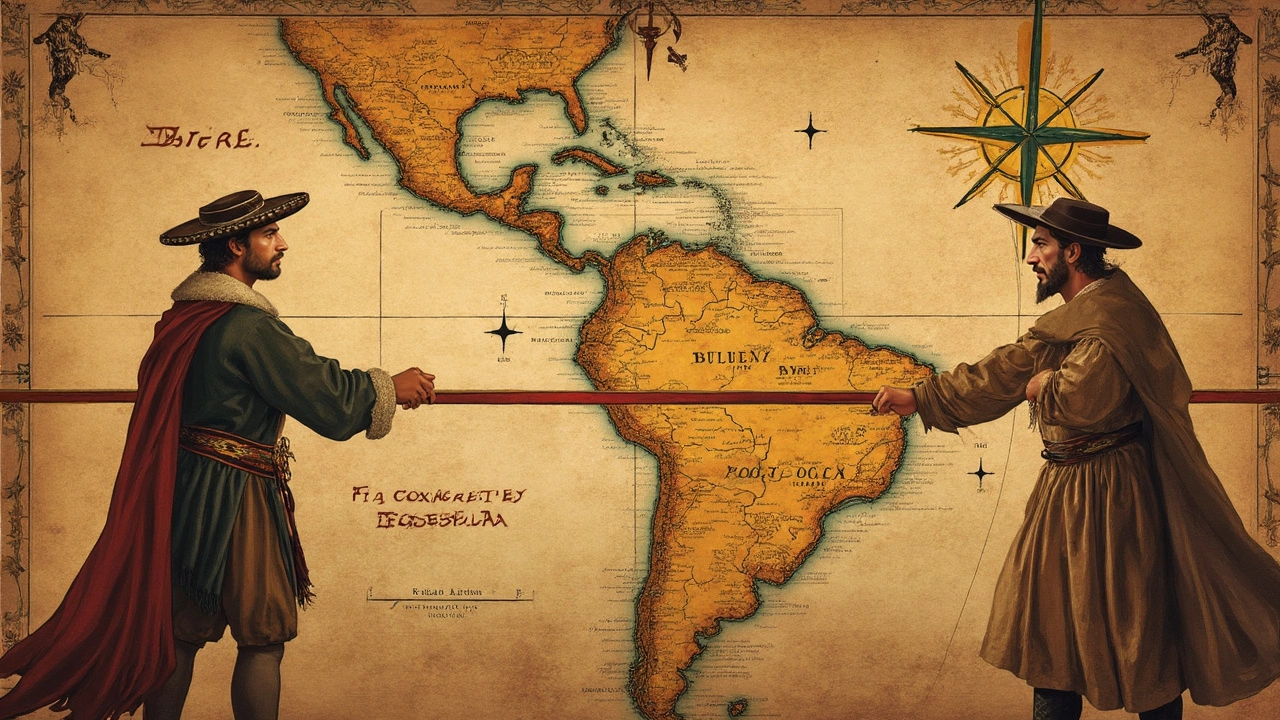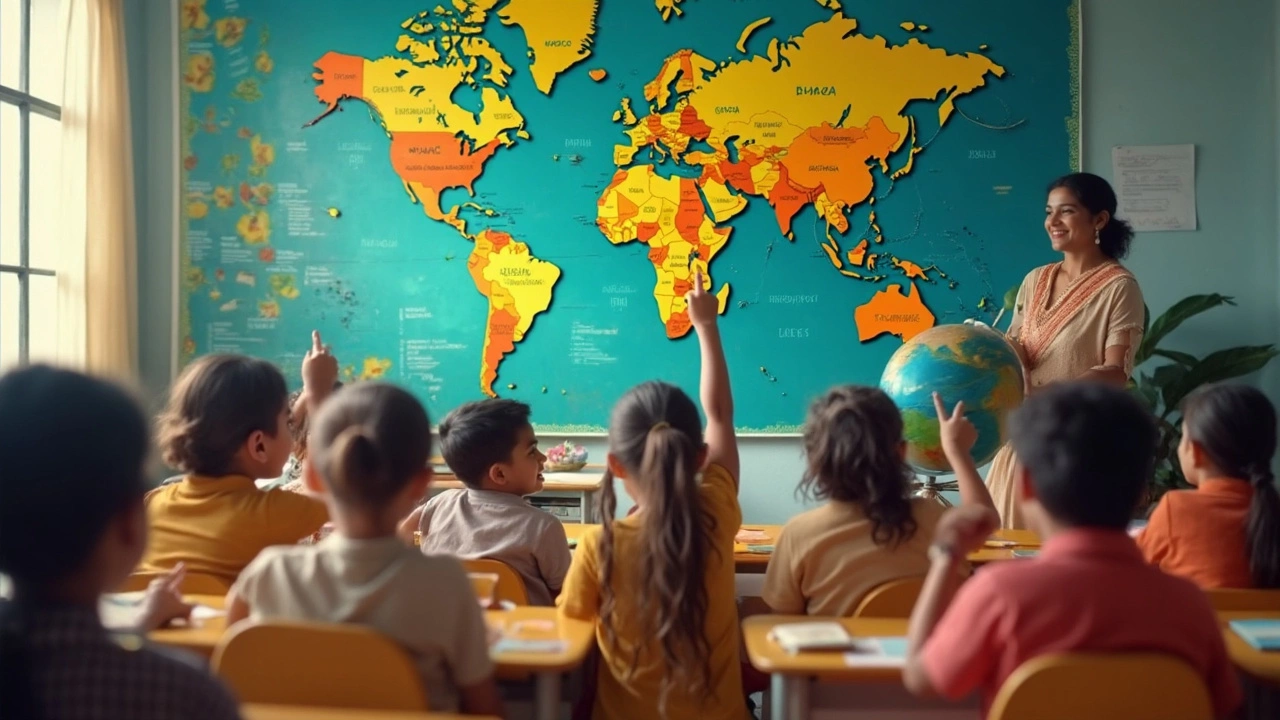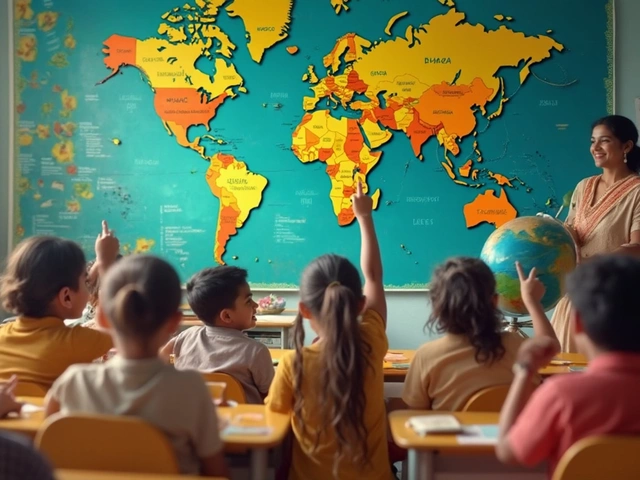Quick quiz: you're setting up to watch Argentina vs. Brazil in rugby, but you stop—why does everyone in Brazil speak Portuguese instead of Spanish? They’re surrounded by Spanish-speaking countries, so it feels odd, right?
The answer goes way back to old European rivalries. Portugal and Spain weren't just neighbors; they were fierce competitors, each scrambling for land in the Americas. In 1494, the Treaty of Tordesillas basically said, 'Hey, Spain, you get this half, Portugal you get that one.' That imaginary line—drawn by folks with little idea of what South America even looked like—planted Portuguese language right in Brazil's soil, while the rest got Spanish.
- The Real Story: Why Portuguese Took Over Brazil
- Drawing Borders and Splitting Languages
- Everyday Mix-Ups: Sports, Travel, and Chat
- How Language Shapes Rugby in Brazil
The Real Story: Why Portuguese Took Over Brazil
If you look at the map, all of South America screams Spanish... except for Brazil. That’s no accident. It all started in 1494, way before rugby was even a thing, with a deal called the Treaty of Tordesillas. Spain and Portugal went to the Pope, arguing over who got what in the “new world.” The Pope drew a line down the map—almost literally—and said everything on one side was Spain’s, the other side, Portugal’s.
Brazil ended up on Portugal’s side of the line, but here’s the kicker: that line was just a guess. Nobody in Europe really understood how massive Brazil was, or how much of it lay east of the line. Soon, Portuguese explorers claimed more land than planned. Before anyone noticed, Portuguese became the rule for everyone in the Brazilian part of South America.
There’s a great way to remember this: “Brazil’s borders were drawn by people who’d never even seen Brazil.” A language expert from the University of São Paulo said it best:
"The Portuguese started in a small corner, but kept pushing west, bringing their language with them. This is why today, Brazilians identify with Portuguese, while their neighbors stick with Spanish."
Even after other countries broke away from Spanish or Portuguese rule, language stuck around. Portugal held onto Brazil for over three centuries. So over time, Portuguese wasn’t just the official language—it became the voice of daily life, school, and even sports commentary.
Drawing Borders and Splitting Languages
The story of why Brazilians speak Portuguese and not Spanish is all about lines on a map—lines drawn without even knowing what was really there. Back in 1494, Portugal and Spain signed the Treaty of Tordesillas. They were both racing to claim more land during the Age of Discovery. This treaty created an invisible line from top to bottom across what is South America today. Portugal got everything to the east, so when they landed in what’s now Brazil, it became theirs, language and all.
But if you look at a map, that line really didn’t match Brazil’s borders now. For a long time, the Portuguese ignored the old line and just kept exploring west. Over the years, explorers and settlers—often looking for gold, sugar, and places to launch new settlements—pushed the Portuguese border way past that old divide. Spain was too busy (and often too far away) to stop them. In the end, when South American countries finally became independent in the 1800s, Brazil had expanded into a much bigger area, but by then everyone was already speaking Portuguese.
This border bungle stuck. That’s why if you check any rugby fixture between Brazil and, say, Uruguay or Argentina, the players from Brazil talk strategy in Portuguese while their rivals answer in Spanish. Even street signs and stadium chants flip languages when you cross these old colonial lines—it doesn’t feel natural, but it’s all down to stubborn old treaties and centuries of people stretching the rules.

Everyday Mix-Ups: Sports, Travel, and Chat
Brazilians get asked all the time, "Why don’t you speak Spanish?" It’s an honest mistake. If you’re booking a trip for a rugby tour, it’s easy to expect Spanish will get you by anywhere in South America. But step into Rio, and it’s all Portuguese. Try ordering food or asking directions using Spanish and you’ll probably get a polite smile—and a reply you might not understand!
It goes both ways. Brazilian rugby teams often bump into confusion at South American tournaments. Coaches have to prep their players: that quick chat with referees or the other team probably needs a translator, because misunderstanding calls can happen fast. In fact, World Rugby events in South America usually offer info in both languages to keep everyone on the same page.
Even on TV, things get mixed up. If you flip channels during a big match like Brazil vs. Uruguay, the Spanish commentary will sound nothing like the Portuguese version. Fans who travel for away games usually pick up a few Spanish basics before crossing the border, just so they don’t get lost on the subway or misread a street sign.
One helpful tip for anyone traveling to Brazil is to learn a few key Portuguese phrases. Simple words—like "por favor" for "please," "obrigado" for "thank you," and, if you’re headed to a Brazilians rugby fixture, "quando é o jogo?" (when is the game?)—go a long way. While lots of Brazilians understand bits of Spanish thanks to TV and music, English speakers will find Portuguese feels closer to Italian or French than Spanish in real life conversations.
How Language Shapes Rugby in Brazil
Brazilian rugby doesn’t just run into tackles on the field; it runs into language walls off the field. It’s kind of wild, because most of South America chats in Spanish during rugby fixtures, but in Brazil, it’s all about Portuguese. This might not seem like a huge deal, but it actually changes a lot—how teams talk, how fans follow matches, and even how the sport grows in Brazil.
Start with the basics: rugby resources, coaching materials, and even referee handbooks are usually put out in Spanish or English. Brazilian players and coaches have to either translate stuff or hunt down materials already in Portuguese. That’s extra work compared to teams in Argentina or Chile, who use resources right out of the box. So, Brazil’s rugby community often ends up with its own lingo and culture, a step apart from the rest of South America.
This language divide pops up everywhere. When Brazil’s team, the Tupis, plays away matches, they need translators for press conferences and team logistics. Broadcast crews, rugby commentators, and even fans following the live score usually pick Spanish or English, pushing Brazilians to juggle yet another language. It’s not just about words either. Rugby slang in Portuguese is different from the Spanish lingo Argentina or Uruguay use. If you’re swapping jerseys after a test match, you might laugh about the same tackle, but call it something totally different.
But there’s an upside: being Brazil means standing out. Their rugby posters, social media, and club chants all sound unique in the South American rugby world. This gives the team a strong identity, which is massive for fan support and building the sport locally. The Tupis' fanbase might not be as big as Argentina's Pumas, but they're die-hard, and proud to use Portuguese for everything rugby, on and off the pitch.
| Fact | Data |
|---|---|
| Registered players | 30,000+ |
| Number of clubs | 140+ |
| Language of most coaching materials | Spanish/English |
| Language of club matches | Portuguese |
If you’re planning to watch a rugby match in São Paulo, don’t expect the stadium to echo with Spanish. Listen for the Portuguese chants—they’re loud, fast, and totally different from what you’ll hear in Buenos Aires or Montevideo. Just remember, that language twist? It’s the reason Brazil’s rugby scene stands out on the continent.

